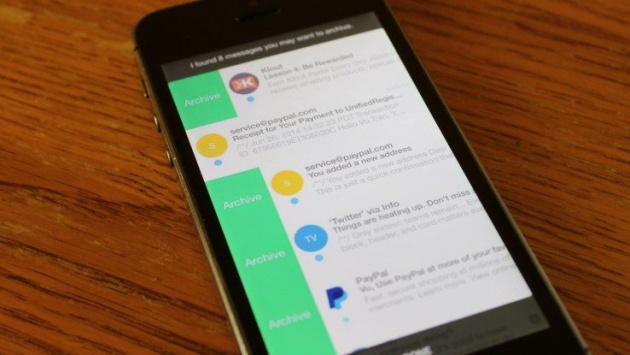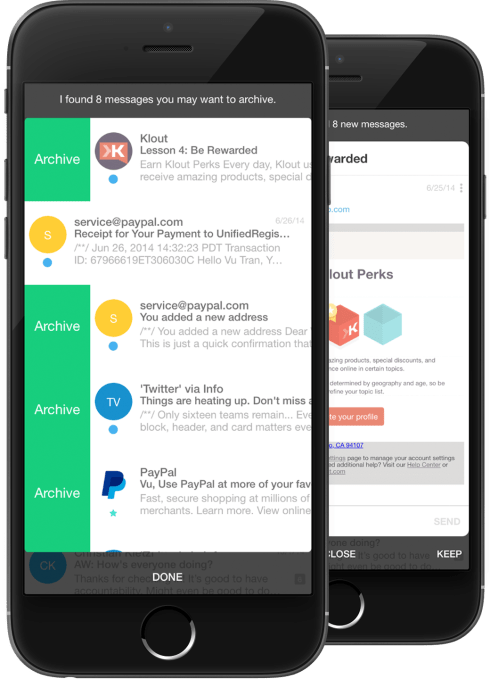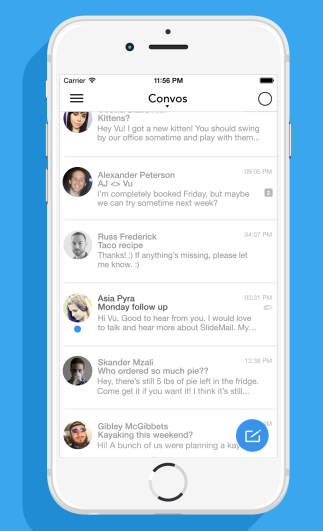
A new email application launching today called SlideMail is designed to help those of us with bad email habits sort through our inbox, while also intelligently organizing our messages and alerting us to important meetings and other events. While other email apps focus on presenting power users with a “priority inbox” containing their most important emails, SlideMail’s take is a little different. To figure out what matters to you, it watches your email activity, learning what you read, trash and archive, and then adapts to that behavior over time.
SlideMail’s creator, Vu Tran, who previously founded the Y Combinator-backed company Framebase, has returned to the accelerator program for the second time to get this new email app off the ground.

He says that, initially, he began developing SlideMail to address his own personal pain points when it came to using email. For instance, he would often get overwhelmed with emails in his inbox and miss important meeting requests. With SlideMail, however, the app can parse the text of your emails to look for dates, times, and other phrasing that indicates an upcoming event, or even a pending flight.
If you use a Gmail add-in like Boomerang Calendar, for example, the technology isn’t all that different here – except with Boomerang’s implementation, you have to click on the underlined dates and times in Gmail’s web interface, then click to add that item to your Google Calendar. In SlideMail, though, the app just reminds you automatically about your upcoming events.
In addition, it can help to locate events it detects on a map, or bring up the latest schedules when it detects an email is referencing an upcoming flight.
The app is also able to identify different types of emails – like receipts, newsletters, or personal emails from people you know, which helps it with categorization. One of its better tricks is its ability to immediately suggest to you, upon first launching the app, which emails it thinks you should archive to make inbox triage quicker. This is presented in a pop-up box that appears overtop your inbox when you open the app, and from here you can either tap “archive” next to its suggestions or just hit “Done” to go to your inbox without taking action.
What differentiates SlideMail from some other email applications on the market today is that SlideMail adapts to you the more you use it. Explains Tran, if there are newsletters that you actually read and keep, it learns to prioritize those better. Meanwhile, it also learns which emails you consistently archive or trash, and then begins to suggest that you archive those.
“Our play is to make the email experience more pleasant and more personal, because your inbox is personal, too.” Tran says.
 While inbox management is the key focus for the app, SlideMail also has the advantage of offering a bit more privacy than some other mobile email clients. Many apps today store a copy of your inbox on their server, but SlideMail does not – all the processing takes place in the app itself. And if you delete the app from your phone, your data is gone. Tran says the plan is to add encryption to the system in the future, too.
While inbox management is the key focus for the app, SlideMail also has the advantage of offering a bit more privacy than some other mobile email clients. Many apps today store a copy of your inbox on their server, but SlideMail does not – all the processing takes place in the app itself. And if you delete the app from your phone, your data is gone. Tran says the plan is to add encryption to the system in the future, too.
Smarter Email For The Mainstream (Not Power Users)
SlideMail has been in private testing with around 8,000-plus testers prior to today’s launch, and has been adding new testers at a rate of 800 to 1,000 per day, the founder notes. During this beta period, Tran found that the app actually resonated more with the non-technical, non-power user crowd, even though he had originally built it for power users like himself.
Technical users and business users are already engrained in using their own email habits, Tran explains, and if SlideMail fails to offer them a feature they rely on, then it’s deal breaker.
“So we distributed [the beta build] to random people – like older folks and college students. And what really surprised me was that the retention numbers were a lot higher for them,” says Tran. “The features that they liked were a lot higher than the ones that the technical people liked.”
He realized then that maybe they had been targeting the wrong people with SlideMail. Now the team is working to make the app more accessible to this more mainstream audience, who prefer simplified experiences.
The app is currently a free download on iTunes. Versions for iPad, then Mac, and finally Android will be developed in the future.
SlideMail’s small team includes the designer from popular email app Mailbox (acquired by Dropbox). Tran also says that, eventually, the startup wants to build out a suite of productivity apps for its audience.






